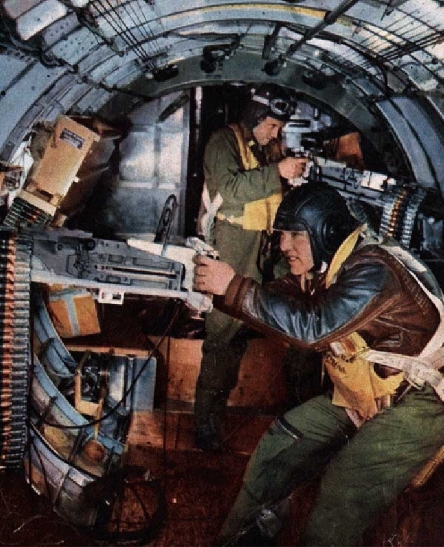|
World War Two Film Clips 
Click here to read about the harried everyday life on a U.S. bomber base in England...
"Somebody on our transport said that a transport ship was like a moving van. Somebody else said it was more like a freight car. But the Supply Officer, a short, skinny man who wrote poetry for the ship's daily paper, gave us the best description. He said that a transport was like a tenement house. That, I think, was the best I heard that day... A troopship is like a tenement house in many ways." "The motto of the Engineer Amphibian Command is "Put'em Across", and its principle is aptly put by Brigadier General Daniel Noce (1894−1976) , chief of the U.S. Army's amphibious operations in the European theater, who built this force from scratch. 'Water between us and the enemy is an avenue, not an obstacle' he says."
Within hours of the Pearl Harbor attack, the nations of Costa Rica, Nicaragua and the Dominion of Canada all declared war upon Imperial Japan. The United States wouldn't do so until the next morning.
Although there were a number of Latin American countries that declared war on the Axis, only two, Brazil and Mexico, put men in the field (Mexican nationals served in the U.S. military)- click here to read about the Brazilians. Five months before America entered the war, pollsters sallied forth onto the streets with numerous queries:
"On the question, 'Shall the United States enter the war to help Britain defeat Hitler?' The New York Daily News and the Chicago Tribune found war sentiment ranging from 3 out of 10 voters in New York State to 2 out of 11 in Illinois." Using the most accurate figures available to them at the time, the editors at PM Daily News compared and contrasted the two world wars for their readers in their VJ-Day issue. Hallett Abend (1884 - 1955) was an American journalist who lived in China for fifteen years. He covered the Sino-Japanese War during its early years and had seen first-hand the beastly vulgarity of the Japanese Army. After Pearl Harbor, the editor at Liberty turned to him in hopes that he would explain to the American reading public what kind of enemy they were fighting:
"In four and a half years of warfare [in China], the Japanese have taken almost no prisoners... Chinese prisoners of war are shot." |
MORE ARTICLES >>> PAGE: * 1 * 2 * 3 * 4 * 5 * 6 * 7 * 8 * 9 * 10 * 11 * 12 * 13 * 14 * 15 * 16 * 17 * 18 * 19 * 20 * 21 * 22 * 23 * > NEXT |
|